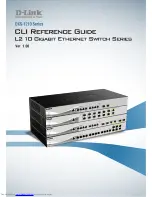
DXS-1210 Series Smart Managed Switch CLI Reference Guide
2
NOTE: A note indicates important information that helps you make better use of your device.
NOTICE: A notice indicates either potential damage to hardware or loss of data and tells you how to
avoid the problem.
CAUTION: A caution indicates a potential for property damage, personal injury, or death.
Command Descriptions
The information pertaining to each command in this reference guide is presented using a number of
template fields. The fields are:
•
Description - This is a short and concise statement describing the commands functionality.
•
Syntax - The precise form to use when entering and issuing the command.
•
Parameters - A table where each row describes the optional or required parameters, and
their use, that can be issued with the command.
•
Default - If the command sets a configuration value or administrative state of the Switch then
any default settings (i.e. without issuing the command) of the configuration is shown here.
•
Command Mode - The mode in which the command can be issued. These modes are
described in the section titled “Command Modes” below.
•
Command Default Level – The user privilege level in which the command can be issued.
•
Usage Guideline - If necessary, a detailed description of the command and its various
utilization scenarios is given here.
•
Example(s) - Each command is accompanied by a practical example of the command being
issued in a suitable scenario.
Command Modes
There are several command modes available in the command-line interface (CLI). The set of
commands available to the user depends on both the mode the user is currently in and their privilege
level. For each case, the user can see all the commands that are available in a particular command
mode by entering a question mark (?) at the system prompt.
The command-line interface has threepre-defined privilege levels:
•
Basic User - Privilege Level 1. This user account level has the lowest priority of the user
accounts. The purpose of this type of user account level is for basic system checking.
•
Operator - Privilege Level 12. This user account level is used to grant system configuration
rights for users who need to change or monitor system configuration, except for security
related information such as user accounts and SNMP account settings, etc.
•
Administrator - Privilege Level 15. This administrator user account level can monitor all
system information and change any of the system configuration settings expressed in this
configuration guide.
The command-line interface has a number of command modes. There are three basic command
modes:






































